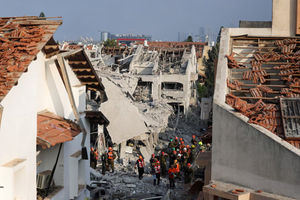Why ITC is wrong on aid versus trade for Africa
What you need to know:
The situation might be marginally better in multilateral negotiations which bring together several/many LDCs and multilateral institutions. In such a situation, the severalty of the dealers on both sides of the negotiating table act as checks and balances... As the ki-Swahili saying has it: ‘palipo wengi hapaharibiki neno!’ The more, the merrier - in a positive sort of way!
With the likes of Arancha González as head of the International Trade Centre (ITC), Africa doesn’t need enemies in its struggle for equality and a Win-Win situation in business transactions. ITC is a subsidiary of the UN Conference on Trade & Development and the World Trade Organization.
ITC was set up in 1964 to provide technical assistance on global trade to developing countries.
It’s surprising that the Centre’s Spanish executive director, Ms Gonzalez, should trample underfoot the veritable truth that developing countries like Tanzania aren’t adept at negotiating profitable trade agreements...
Responding to a question in an interview with the UN ‘Africa Renewal’ Magazine (Aug. 2014 Edition), Gonzalez said: “I’ve seen African countries negotiate bilaterally and within the WTO. African countries come to the WTO prepared, and defend their interests with vigour. They’ll not sign an agreement until their interests have been taken into account!”
The remark which drew that comment was: acting ‘from a position of weakness, African countries can’t be very assertive at the negotiating-table.’
Let me put it in contextual perspective... ‘What does Africa need more: aid or trade?’ asked Africa Renewal’s Nirit Ben-Ari and Kingsley Ighobor in a joint Question&Answer session.
Ms Gonzalez’s response: ‘It’d be a simplification to make countries choose between aid and trade. The reality’s that both are needed. The question isn’t whether to choose between aid or trade, but how to balance the two.’
Fair enough...
Then comes the 64,000-dollar question: ‘Do you believe trade agreements tend to favour developed economies at the expense of weaker ones?’
Ms Gonzalez: ‘No; that presupposes that African countries are incapable of negotiating profitable trade pacts. I don’t think this is true.’
Really...? Sheesh!
In My Book of Things, there’s no doubt that most African and other least developed countries (LDCs) invariably come off worse than second-best in bilateral trade and other negotiations vis-à-vis prospective partners/investors from the developed world!
Behind that gross weakness is a singular lack of negotiation skills on the part of the African/LDCs... That weakness is further weakened, severely compounded as it is by grand corruption and selfish greed - routinely creaming a percentage off the top of deals being negotiated!
The situation might be marginally better in multilateral negotiations which bring together several/many LDCs and multilateral institutions. In such a situation, the severalty of the dealers on both sides of the negotiating table act as checks and balances... As the ki-Swahili saying has it: ‘palipo wengi hapaharibiki neno!’ The more, the merrier - in a positive sort of way!
Tanzania has a bazillion living examples of such shoddy, dubious deals, the result of a severe shortage of negotiating skills and/or rampant grand corruption. Recent examples date back to the early 1990s when the country embarked upon privatization of thitherto state/communally-owned enterprises.
The situation got worse with the adoption of the 1997 Mining Policy and the 1998 Mining Legislation which were so blatantly lopsided in favour of ‘gold-digger’ transnationals that ordinary Tanzanians are heavy losers of their God-given natural resources, including especially minerals!
An emerging example is the Statoil-ExxonMobil natural gas (Block-B) Production-Sharing Agreement under which Tanzania’ll reportedly lose $55bn (Sh92trn) at most if not renegotiated equitably! [TheCitizen: Aug 28, 2014].
It boils down to who’s to be believed on negotiation skills between ITC’s Arancha Gonzalez, The Citizen and Prof Costa Mahalu, Chancellor of the Bagamoyo University. Mahalu unwittingly contradicts Mama Gonzalez, categorically stating that LDCs, including Tanzania, miserably lack effective negotiating skills in investment and trade dealings.
That stand was supported by Dr. Jonathan Mbwambo of the Tanzania Education & Vocational Training ministry, at a regional training programme on investment, trade and marketing negotiating skills, sponsored by Sweden-based Nordic-Africa Institute (NAI). [Tanzania-Daima: Aug. 23, 2014].
If NAI says African and LDCs lack transactional negotiating skills – and the Tanzania Revenue Authority urges renegotiation of extant Production-sharing and Mining Development Agreements (See The Citizen: Sept. 4, 2014) – who is Arancha Gonzalez to say otherwise? Cheers! [[email protected]].




